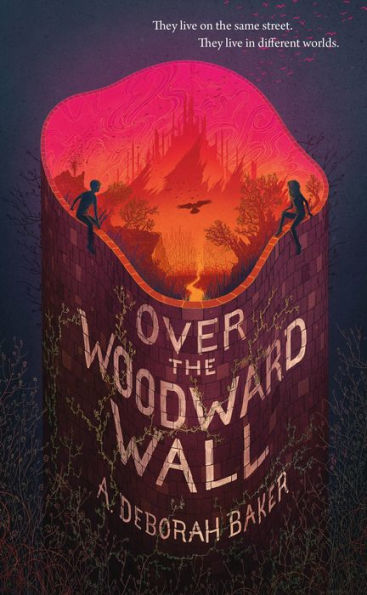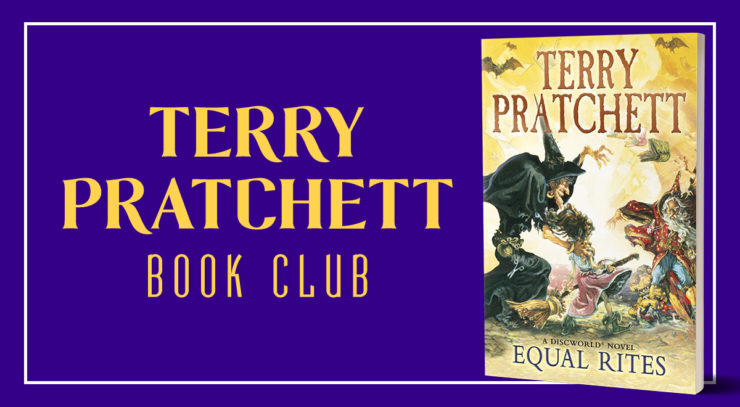It’s time to grab a broomstick and get flying (or maybe it’s dawdling or sort of meandering)… We’re up for a second helping of Equal Rites.
Summary
Granny Weatherwax explain Esk’s predicament to her: She can’t be a wizard because she’s a girl and women can only be witches, but she’s definitely got wizard magic. After getting Esk to unwittingly demonstrate her powers, Granny explains that she’ll only learn what she needs to learn at wizard school, and writes a letter to inform the head wizard of the Unseen University. The next day they head back into Bad Ass so that Granny can give Esk’s family the news, and when her brothers come out and tease her, she turns one of them into a pig. Having made the point about training for her, Granny and Esk set off the next day to find the University. They start by heading into Ohulan Cutash, a very small city, and once there they meet an old acquaintance of Granny’s—Hilta Goatfounder. They sit and have tea and Hilta reads Esk’s palm and notes that she’s headed on a very long journey. Granny asks where the Unseen University might be, and Hilta tells her that it’s in Ankh-Morpork, five hundred miles away. She insists they stay the night before heading off.
On their way to Hilta’s, Esk purposefully gets lost and ends up causing a fair share of mayhem on the streets before getting tired and heading into a tavern. She turns the bar’s beer into milk because she wants some, then turns it into peach brandy when the barman asks if she might change it back to beer. The barman and his wife (Mr. and Mrs. Skiller) offer to let her stay the night while Granny and Hilta give up their search for her; Swiller and his wife then try to take Esk’s staff, which doesn’t take kindly to the pilfering so Esk leaves, heading down to the docks. She finds a barge full of wool, and not knowing anything about barges, falls asleep there. The next day she’s woken up by the man who owns the barge—his people are the Zoons, traders, and they’re on the river Ankh. Granny and Hilta use her crystal ball to find out where Esk has got off to, and Granny decides to walk after the barge.
Buy the Book


Over the Woodward Wall
Esk is with Amschat B’hal Zoon and his family, Amschat being their tribal Liar—the Zoon people do not lie, so they have to appoint one specific person to lie on their behalf, being merchant traders. To continue on her way down the river, Esk offers to help around the barge in exchange for passage. She’s worried about the magic, which is getting harder to keep under wraps. Finally, her canniness proves to be too much during a trade where she prevents Amschat from being swindled—Esk leaves, planning to end her time on the barge, but her staff is still onboard. She uses magic to get it to her, not realizing what outlying effects this will have, and opts to dress the staff up as a broom so that no one will think twice about it. She wanders about, learns more about the town (called Zephim) and stumbles upon a wizard named Treatle and his trainee, Simon, who are negotiating passage to the city. Esk opts to do the same.
In the meantime, Granny has got herself caught in a bear trap with a bear, and gets found by a group of dwarves. They briefly consider filling the hole with her in it, but she convinces them to repair Hilta’s broomstick for her. Esk is on the caravan trail and subconsciously protecting everyone from gnolls and anything else that may want to harm the travelers. She talks with Simon, who has an impressive stammer and is very excited to study to become a wizard because of all the books he’ll get to read. Esk asks him if a woman could be a wizard and he appears to consider it before Treatle insists otherwise. Esk tries to engage him on that point, but he has a lot of ideas about what women’s brains can do and what men’s brains can do, and insists that wizard magic is high magic. Treatle makes Esk so angry that she runs off, vowing in her own mind to be a witch and wizard both. She then has a spectacular nightmare about a large black castle she cannot enter and a voice sniggering at her.
Book Club Chat
In my book, the best part about this is all the ways the Pratchett invokes the original conceit around women who earned the label “witch” throughout history—namely, women who were concerned with women’s health. We see that in Hilta’s trade, which clearly deals largely in contraceptives and the like, and of course in Granny’s midwifery. Also, I just really love Hilta? Which is definitely because I know my fair share of women just like her. (My parents were both of a hippie variety, you can’t get around having women like Hilta in your life when that happens.) With the jewelry and the palmistry and the herbal aids and so on.
Plenty of fantasy tomes and games trade on the concept of “races” and “peoples” and throw around words like “gypsy” and “bandits”, and you find yourself cringing because why do it at all? Categorization is needed in parts of worldbuilding, but it’s often an ugly and deeply biased exercise, no matter how hard an author tries to be smart and sensitive about their construction of a fictional world. I think one of the reasons that Pratchett manages it far better than others is the reason why Discworld continues to be so relevant and sharp decades later—he knows that people are just people. So when we meet the Zoon, it could go incredibly wrong, but there’s no judgment in how they’re presented. Amschat is his tribe’s resident Liar (and the fact that the narrative says the rest of the world really wishes they would be polite and call them “diplomats” is just excellent), and he has three wives and a few kids, and that’s just how it works. Polyamorous merchant traders who cannot lie. There they are.
But I also noticed how much of this book is playing on the concept that some children are more about bluntness than disseminating—Esk is definitely one of those kids, and part of the enjoyment of the story is in watching her match wits against people who either try to take advantage of her or don’t, and why they do that and how well they come out of that transaction depending on their behavior. She moves the story because she herself is wonderfully immovable in how she views the world at present. When you’re only nine, you kind of have to view the world Your Way, or it’s too horribly big to be a part of.
There’s also Granny, whom I love not for the ways that she’s right, but for all the ways that she’s inevitably wrong. Tough old matriarchs are great stock characters, but when they’re just scathing and brook no nonsense, they can’t really do much in a story besides glare and have great one-liners. (I played those parts as lot when I was a theater kid, so I remember them well—and one-liners are so fun, but they’re not hard to pass off if you’ve got the timing. They’re not meaty roles, is what I’m saying.) Granny’s imperfections are what allow her to take part in the arc rather than run alongside it, and every mess she gets into delights more than the last.
My thoughts around gender in stories like this are always complicated by being nonbinary—I admire Esk’s desire to be both a witch and wizard because that’s always where I come down in arguments where I’m told I have to be on one side of a binary or another. There’s a particular brand of dismissiveness that gets thrown at you when you’re a woman or AFAB (that’s “assigned female at birth” for those not up on that lingo, which I also am) which results in precisely the kind of anger that Pratchett describes, the way it kind of takes over your whole body. Treatle does a perfect job at distilling those conversations down to their diamond essence—women are good for people things and daily tasks, women are just so emotional, women’s brains can’t grasp numbers, and so on.
Ugh. He’s lucky Esk didn’t make him explode in a fireball.
Asides and little thoughts:
- Anyone else get serious Gandalf-going-Bilbo-Baggins-do-not-take-me-for-some-conjurer-of-cheap-tricks vibes from Granny telling Esk to use the staff to start the fire?
- “He had the kind of real deep tan that rich people spend ages trying to achieve with expensive holidays and bits of tinfoil, when really all you need to do to obtain one is work your arse off in the open air every day.” This is a spectacular own, in no small part because people often don’t know that it used to be the opposite—in ancient times, being paler was considered more desirable because it proved you didn’t have to work outdoors. Beauty standards, y’all.
- This section made me do a double-take: “One reason for the bustle was that over large parts of the continent other people preferred to make money without working at all, and since the Disc had yet to develop a music recording industry they were forced to fall back on older, more traditional forms of banditry.” He’s talking about music moguls stealing artist’s work, right? Not musicians themselves? Because if it were the latter, I’d be disappointed.
- There’s a reference to Hilta’s broom being the broomstick version of a “split-window Morris Minor” and if you have no idea what those are, I highly recommend you look them up because it’s like a VW Beetle had a baby with a far more stately car, and it came out all lumpy and weird, and I adore them.
Pratchettisms:
She loved her brothers, when she reminded herself to, in a dutiful sort of way, although she generally remembered them as a collection of loud noises in trousers.
Their wills clanged like cymbals and the air between them thickened. But Granny had spent a lifetime bending recalcitrant creatures to her bidding and, while Esk was a surprisingly strong opponent, it was obvious that she would give in before the end of the paragraph.
The dockmaster sagged as though a coat hanger had just been removed from his shirt.
You can have whirlpools in the fabric of existence, because it’s a very strange fabric.
Wizards are martyrs to things like asthma and flat feet, it somehow seems to give them their drive.
Next week, we’ll make it up to “And the floor was covered with a fine layer of silver sand.” Until then!










